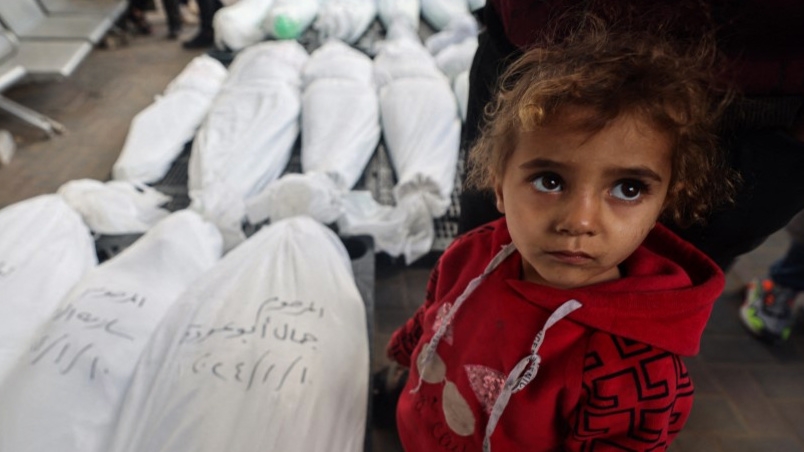Gaza 100 days on: To Israel's American backers, Arabs and Muslims are better off dead

The United States and its ideological partners in the West have long tried to convince the Global South, and Arabs and Muslims in particular, that they share a closer ideological and values-based affinity as compared with other aspiring world powers.
This was certainly the case with communism, and since the collapse of the Soviet Union, it has been refashioned against a resurgent Russia and an emerging China.
The values argument usually centres on authoritarianism versus democracy, with the US focusing on issues such as Russia’s support for Serbia against Bosnia, the Chechen wars, and more recently, Moscow’s support for the Assad regime in Syria.
Against China, the US trots out the treatment of Uyghurs and communist China’s oppression of religions in general, but Islam in particular.
Where our alliances should stand, and why, has been a long-simmering topic of debate.
Stay informed with MEE's newsletters
Sign up to get the latest alerts, insights and analysis, starting with Turkey Unpacked
The 100 days since Israel's genocidal war on Gaza began have now injected a fresh perspective on this question, prompting us to re-evaluate those alliances with a realistic lens.
Although much has been written about the brutal assault on Gaza and Palestinians, the full ramifications are not yet truly appreciated. We live in an increasingly connected world, but that connectivity has not brought all people closer.
Rather, we are increasingly aware that people care about different things in different parts of the world. And while some are honest about it - “I care about my people” - others are far less so, or even genuinely deluded.
Into that latter camp falls most of Western Europe and the US, who proclaim a commitment to human rights and democracy, while assiduously undermining both everywhere but at home - and even at home when it comes to Arabs, Muslims and Palestinians.
That hypocrisy has been on display for the whole world to see during Israel’s brutal assault on Gaza. Arabs, Muslims, and indeed much of the Global South, have witnessed this double standard - and many are recalibrating their vision of the international order.
Western propaganda
It would be a mistake, however, to believe that this hypocrisy is an anomaly, limited only to the plight of Palestinians. Indeed, western support for human rights and democracy across the Global South would be an anomaly - but many of us have been such avid consumers of western propaganda that we seem surprised at western inaction over the mass killing of Arabs and Muslims.
It’s hard to pinpoint a time when this western attitude - a heartless compulsion to see Arab and Muslim blood spilled, with those remaining alive under the yoke of oppressive tyranny - did not prevail.
Follow Middle East Eye's live coverage of the Israel-Palestine war
One could go back a decade to the tacit, and then explicit, support of the American and European governments for the military coup against the democratically elected government of Mohamed Morsi in Egypt. After the Egyptian military killed hundreds of Egyptians in cold blood, former US President Barack Obama rewarded the general who gave the orders by rolling out the red carpet for him, as did many other western leaders.
But that wouldn’t be the first such instance. During Israel’s 2006 onslaught against Lebanon, the former US secretary of state, Condoleezza Rice, dismissed it as the “birth pangs of a new Middle East”. That new Middle East, of course, was to be steeped in Arab blood.
And Madeleine Albright, another former US secretary of state, once said, when asked in 1996 about whether the reported deaths of half a million Iraqi children was an acceptable price to pay for US policy in the country: “The price is worth it.”
These voices are now seared into our collective consciousness, and we will never forget those responsible for their misery
Albright, Rice and the current secretary of state, Antony Blinken, represent one continuous and consistent approach to the Middle East, and the true values of American foreign policy: Arabs must either be dead, or under the control of regimes that do the bidding of the US.
Today, the US is supplying weapons, financing and diplomatic cover for Israel’s assault on a civilian population that has already been displaced and traumatised. Despite the globally connected world in which we live, it is unlikely that the average American is feeling the same depth of emotion over the plight of Palestinians as the average Arab.
While Americans watch congressional debates over dubious allegations of antisemitism, Arabs are listening to the unfiltered voices of Palestinians. And while Gaza may quickly recede from Americans’ memories, it will be a long time before Arabs forget the mother searching for her seven-year-old, or the child who identified her mother by her hair, or the father searching for his three children. These voices are now seared into our collective consciousness, and we will never forget those responsible for their misery.
There was a time when the Arab masses were unsure about who represented the real face of American policy. But there is a saying that when someone persists in trying to tell you who they are, believe them. We believe you.
The views expressed in this article belong to the author and do not necessarily reflect the editorial policy of Middle East Eye.
Middle East Eye delivers independent and unrivalled coverage and analysis of the Middle East, North Africa and beyond. To learn more about republishing this content and the associated fees, please fill out this form. More about MEE can be found here.





